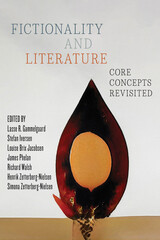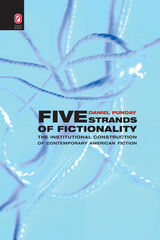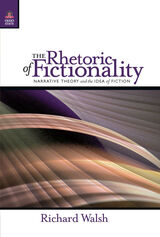3 books about Fictionality

Fictionality and Literature
Core Concepts Revisited
Lasse R. Gammelgaard
The Ohio State University Press, 2022
Taking its cues from Richard Walsh’s influential 2007 book, The Rhetoric of Fictionality, Fictionality and Literature sets out to examine the implications of a rhetorical understanding of fictionality. A rhetorical approach understands fictionality and nonfictionality not as binary opposites but as different means to the same end: influencing an audience’s understanding of the world. Arguing that fiction is not just a feature of particular works, such as novels, but an adaptable instrument used to achieve an author’s specific rhetorical goals, the contributors theorize how to reconceive of core literary features and influences such as author, narrator, plot, character, consciousness, metaphor, metafiction/metalepsis, intertextuality, paratext, ethics, and social justice. Combining analyses of a wide range of texts by Colson Whitehead, Charles Dickens, Kazuo Ishiguro, Toni Morrison, Geoffrey Chaucer, and others with historical events such as the Nat Tate biography hoax and the Anders Breivik murders, contributors discuss not only a rhetorical definition of fictionality but also the wider consequences of such a conception. In addition, some chapters within Fictionality and Literature offer alternatives to a rhetorical paradigm, thus expanding the volume’s representation of the current state of the conversation about fictionality in literature.
Contributors:
H. Porter Abbott, Catherine Gallagher, Lasse R. Gammelgaard, Stefan Iversen, Louise Brix Jacobsen, Rikke Andersen Kraglund, Susan S. Lanser, Jakob Lothe, Maria Mäkelä, Greta Olson, Sylvie Patron, James Phelan, Richard Walsh, Wendy Veronica Xin, Henrik Zetterberg-Nielsen, Simona Zetterberg-Nielsen
Contributors:
H. Porter Abbott, Catherine Gallagher, Lasse R. Gammelgaard, Stefan Iversen, Louise Brix Jacobsen, Rikke Andersen Kraglund, Susan S. Lanser, Jakob Lothe, Maria Mäkelä, Greta Olson, Sylvie Patron, James Phelan, Richard Walsh, Wendy Veronica Xin, Henrik Zetterberg-Nielsen, Simona Zetterberg-Nielsen
[more]

Five Strands of Fictionality
The Institutional Construction of Contemporary American Fiction
Daniel Punday
The Ohio State University Press, 2010
Fictions, we are so often told, are everywhere in America today. The extravagant claims of advertising are everywhere, much of the day’s news concerns “pseudo-events” like rallies or ceremonies staged so that they can be reported on, and philosophers doubt even the possibility of any knowledge being objective. Thus we seem less and less able to distinguish between the real and the invented.
In Five Strands of Fictionality: The Institutional Construction of Contemporary American Fiction, Daniel Punday examines the “postmodern” expansion of fictionality—the feeling today that the line between the real and the invented is harder to draw—and argues that this feeling reflects a struggle by different cultural groups to define how we tell and use “literary” stories. He discusses the literary texts of John Barth, Alice Walker, and Ishmael Reed; paraliterary forms like science fiction and electronic writing; and resolutely nonliterary texts, especially role-playing games, in terms of how each responds to the institution of literature through its definition of fictionality.
For too long, postmodernism has been described by easy generalizations—relativist, indeterminate, commercialized—that have rendered the term nearly worthless. Punday applies a more nuanced understanding of fictionality to a variety of contemporary narrative forms that occupy different locations within postmodern literary culture. Approaching postmodernism as a configuration of institutions that legitimize fictionality, he illuminates the nature of creative writing and the conflicts between different literary groups in America today.
[more]

The Rhetoric of Fictionality
Narrative Theory and the Idea of Fiction
Richard Walsh
The Ohio State University Press, 2007
Narrative theory has always been centrally concerned with fiction, yet it has tended to treat fictions as if they were merely the framed or disowned equivalents of nonfictional narratives. A rhetorical perspective upon fictionality, however, sees it as a direct way of meaning and a distinct kind of communicative gesture. The Rhetoric of Fictionality: Narrative Theory and the Idea of Fiction by Richard Walsh argues the merit of such a perspective and demonstrates its radical implications for narrative theory.
A new conception of fictionality as a distinctive rhetorical resource, somewhat like the master-trope of fictional narrative, cuts across many of the core theoretical issues in the field. The model, set out in chapter one, is subsequently tested and elaborated in relation to currently prevalent assumptions about narrativity and mimesis; narrative structure; the narrator and transmission; voice and mediacy; narrative media and cognition; and creativity, reception, and involvement. Throughout, the theoretical analysis seeks to vindicate readers’ intuitions about fiction without merely restating them: the result is a forceful challenge to many of narrative theory’s orthodoxies.
The rhetorical model of fictionality advanced in this book offers up new areas of inquiry into the purchase of fictiveness itself upon questions of narrative interpretation. It urges a fundamental reconception of the apparatus of narrative theory by theorizing the conditions of significance that make fictions conceivable and worthwhile.
[more]
READERS
Browse our collection.
PUBLISHERS
See BiblioVault's publisher services.
STUDENT SERVICES
Files for college accessibility offices.
UChicago Accessibility Resources
home | accessibility | search | about | contact us
BiblioVault ® 2001 - 2024
The University of Chicago Press









